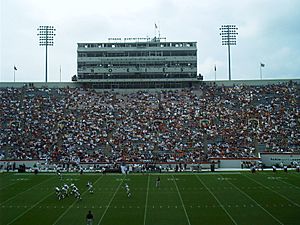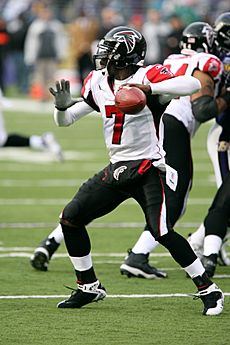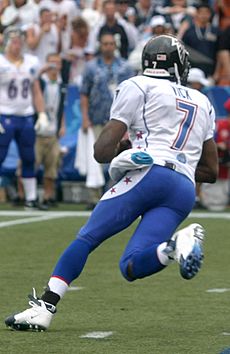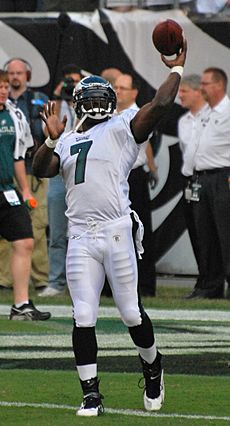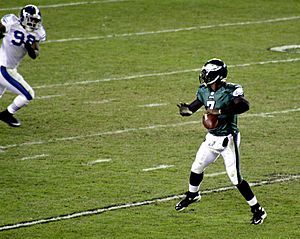Michael Vick facts for kids
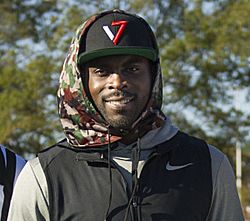
Vick in 2017
|
|||||||||||||||||||
| No. 7, 1, 2 | |||||||||||||||||||
|---|---|---|---|---|---|---|---|---|---|---|---|---|---|---|---|---|---|---|---|
| Position: | Quarterback | ||||||||||||||||||
| Personal information | |||||||||||||||||||
| Born: | June 26, 1980 Newport News, Virginia, U.S. |
||||||||||||||||||
| Height: | 6 ft 0 in (1.83 m) | ||||||||||||||||||
| Weight: | 210 lb (95 kg) | ||||||||||||||||||
| Career information | |||||||||||||||||||
| High school: | Warwick (Newport News, Virginia) |
||||||||||||||||||
| College: | Virginia Tech (1998–2000) | ||||||||||||||||||
| NFL Draft: | 2001 / Round: 1 / Pick: 1 | ||||||||||||||||||
| Career history | |||||||||||||||||||
| As player: | |||||||||||||||||||
|
|||||||||||||||||||
| As coach: | |||||||||||||||||||
|
|||||||||||||||||||
| Career highlights and awards | |||||||||||||||||||
|
|||||||||||||||||||
| Career NFL statistics | |||||||||||||||||||
|
|||||||||||||||||||
| Player stats at PFR | |||||||||||||||||||
Michael Dwayne Vick (born June 26, 1980) is a former American football quarterback who played in the National Football League (NFL) for 13 seasons. Regarded as having transformed the quarterback position with his rushing abilities, he is the NFL leader in quarterback rushing yards and was the league's first quarterback to rush for 1,000 yards in a season. Vick played college football at Virginia Tech, where he received first-team All-American honors and was selected first overall by the Atlanta Falcons in the 2001 NFL Draft. During his six years with the Falcons, he was named to three Pro Bowls and finished second in NFL Most Valuable Player voting in 2004 while leading the team on two playoff runs, one division title, and an NFC Championship Game appearance.
Vick's NFL career came to a halt in 2007 after he pleaded guilty for his involvement in a dog fighting ring and spent 21 months in federal prison. His arrest and subsequent conviction garnered Vick notoriety with the general public, which lasted throughout the rest of his career. He was released by the Falcons shortly before leaving prison.
After serving his sentence, Vick signed with the Philadelphia Eagles for the 2009 season. As a member of the Eagles for five years, he enjoyed his greatest statistical season in 2010, earning him Comeback Player of the Year and a fourth Pro Bowl selection. In his final two seasons, Vick played one year each for the New York Jets and Pittsburgh Steelers, primarily as a backup. He officially retired in 2017 after spending the entirety of the 2016 season as a free agent.
Contents
Early life
Vick was born in Newport News, Virginia as the second of four children to Brenda Vick and Michael Boddie, then unmarried teenagers. His mother worked two jobs, obtained public financial assistance and had help from her parents, while his father worked long hours in the shipyards as a sandblaster and spray-painter. They were married when Michael was about five years old, but the children elected to continue to use their "Vick" surname. The family lived in the Ridley Circle Homes, a public housing project in a financially depressed neighborhood located in the East End section of the port city.
Boddie's employment required a lot of travel, but he taught football skills to his two sons at an early age. Vick was only three years old when his father, nicknamed "Bullet" for his speed during his own playing days, began teaching him the fundamentals. Michael subsequently taught the game to his younger brother, Marcus Vick.
As he grew up, Vick went by the nickname "Ookie", and learned about football from Aaron Brooks, a second cousin who was four years older. Vick and Brooks spent a lot of time at the local Boys and Girls Club.
High school career
Vick first came to prominence while at Homer L. Ferguson High School in Newport News. As a freshman, he impressed many with his athletic ability; he threw for over 400 yards in a game that year. Ferguson High School was closed in 1996 as part of a Newport News Public Schools building modernization program. Vick, as a sophomore, and coach Tommy Reamon both moved to Warwick High School.
Vick was a three-year starter for the Warwick Raiders. Under Reamon's coaching, he passed for 4,846 yards with 43 touchdowns. He added 1,048 yards and 18 scores on the ground. As a senior, he passed for 1,668 yards, accounting for 10 passing and as many rushing touchdowns. During one game, he ran for six touchdowns and threw for three touchdowns.
Reamon, who had helped guide Brooks from Newport News to the University of Virginia, helped Michael with his SATs and helped him and his family choose between Syracuse University and Virginia Tech. Reamon favored Virginia Tech, where he felt better guidance was available under Frank Beamer, who promised to redshirt him and provide the freshman needed time to develop. Reamon sold Michael on the school's proximity to family and friends, and Vick chose to attend Virginia Tech. As he left the Newport News public housing projects in 1998 with a college football scholarship in hand, Vick was seen in the Newport News community as a success story.
College career
In his first collegiate game as a redshirt freshman against James Madison in 1999, Vick scored three rushing touchdowns in just over one quarter of play. He made a spectacular flip to score his last touchdown but landed awkwardly on his ankle, forcing him to miss the remainder of the game and all of the following game. During the season, Vick led a last-minute game-winning drive against West Virginia in the annual Black Diamond Trophy game. He led the Hokies to an 11–0 undefeated season and to the Bowl Championship Series national title game in the Nokia Sugar Bowl against Florida State. Although Virginia Tech lost 46–29, Vick brought the team back from a 21-point deficit to take a brief lead. During the season, Vick appeared on the cover of an ESPN The Magazine issue.
Vick led the NCAA in passing efficiency in 1999, a record for a freshman (180.4) and the third-highest all-time mark. Vick won both an ESPY Award as the nation's top college player and the first-ever Archie Griffin Award as college football's most valuable player. He was invited to the 1999 Heisman Trophy presentation and finished third in the voting behind Ron Dayne and Joe Hamilton. Vick's third-place finish matched the highest finish ever by a freshman up to that point, first set by Herschel Walker in 1980.
One highlight of Vick's 2000 season was his career high rushing total of 210 yards against Boston College in Chestnut Hill, Massachusetts. Against West Virginia University in the Black Diamond Trophy game, Vick accounted for 288 total yards of offense and two touchdowns in a 48–20 win. The following week, Vick led the Hokies back from a 14–0 deficit to beat Syracuse at the Carrier Dome, where the Hokies had not won since 1986. Vick put the game away with a 55-yard run with 1:34 left.
The following game against Pittsburgh, Vick was injured and had to miss the rest of the game. He also missed the game against Central Florida, and was unable to start against the Miami Hurricanes, who handed Virginia Tech their only loss of the season. Vick's final game while playing for Virginia Tech was against the Clemson Tigers in the Toyota Gator Bowl; Virginia Tech won and Vick was named the game's MVP. His football accomplishments in two seasons led to his induction in to the Virginia Tech Sports Hall of Fame in 2017.
Vick left Virginia Tech after his redshirt sophomore season. Aware that the rest of his family was still living in their 3 bedroom apartment in the Ridley Circle Homes, Vick stated that he was going to buy his mother "a home and a car." ESPN later reported that Vick used some of his NFL and endorsement earnings to buy his mother a brand-new house in an upscale section of Suffolk, Virginia.
Statistics
| Season | Passing | Rushing | |||||||||
|---|---|---|---|---|---|---|---|---|---|---|---|
| Comp | Att | Pct | Yds | TD | Int | Rtg | Att | Yds | Avg | TD | |
| 1998 | Redshirt | ||||||||||
| 1999 | 90 | 153 | 58.8 | 1,840 | 12 | 5 | 180.4 | 110 | 580 | 5.3 | 8 |
| 2000 | 97 | 179 | 54.2 | 1,439 | 9 | 7 | 127.4 | 113 | 636 | 5.6 | 9 |
| Career | 187 | 332 | 56.3 | 3,279 | 21 | 12 | 153.1 | 223 | 1,216 | 5.5 | 17 |
Professional career
| Height | Weight | Arm length | Hand size | 40-yard dash | Vertical jump | Wonderlic | ||||||
|---|---|---|---|---|---|---|---|---|---|---|---|---|
| 6 ft 0 in (1.83 m) |
210 lb (95 kg) |
31+1⁄2 in (0.80 m) |
8+1⁄2 in (0.22 m) |
4.33 s | 38.0 in (0.97 m) |
20 | ||||||
| All values from NFL Combine | ||||||||||||
Atlanta Falcons
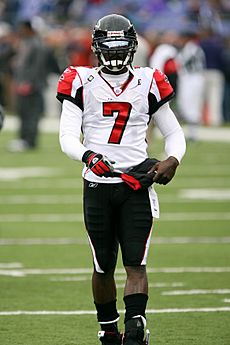
At his Pro Day workout, Vick ran the 40-yard dash in 4.33 seconds; his time has been clocked as low as 4.25, the fastest-ever for an NFL quarterback. Vick was selected first in the 2001 NFL Draft by the Atlanta Falcons, becoming the first African-American quarterback to be taken with the top pick. The San Diego Chargers had the number-one selection, but traded it to the Atlanta Falcons the day before the draft for the Falcons' first- and third-round picks in 2001. Vick was selected in the 30th round of the 2000 Major League Baseball Draft by the Colorado Rockies, despite not playing baseball since the eighth grade.
He signed a six-year $62 million contract.
2001 season
Vick made his NFL debut against the San Francisco 49ers on September 9, 2001, and saw limited action. He completed his first NFL pass to wide receiver Tony Martin in the second quarter against the Carolina Panthers on September 23 and scored his first NFL touchdown on a two-yard rush in the fourth quarter to help the Falcons to a 24–16 victory. Vick made his first start against the Dallas Cowboys on November 11 and threw his first touchdown pass to tight end Alge Crumpler in a 20–13 victory. He accounted for 234 of Atlanta's 255 yards in the season finale against the St. Louis Rams on January 6, 2002. In two starts and eight total games played that season, Vick completed 50 of 113 passes for 785 yards with two touchdowns and three interceptions. He rushed 31 times for 289 yards (9.3 avg.) and one touchdown.
2002 season
Vick made 15 starts in 2002, missing one game against the New York Giants on October 13 with a sprained shoulder. He completed 231 of 421 passes for 2,936 yards and 16 touchdowns. He had 113 carries for 777 yards and eight rushing touchdowns. Vick set numerous single-game career highs during the season, including in passes completed, pass attempts, and passing yards. Vick also set a then-NFL record for most rushing yards by a quarterback in a single game with 173 against the Minnesota Vikings on December 1, broken by Colin Kaepernick (181) in 2013. He tied for third in team history for the best touchdown-to-interception ratio in a season. He had a streak of 177 passes without an interception as the Falcons finished with a 9–6–1 win-loss-tie record and reached the playoffs. On January 4, 2003, Vick led the Falcons to an upset victory over the heavily favored Green Bay Packers 27–7 in the Wild Card Round. The Falcons lost 20–6 to the Donovan McNabb-led Philadelphia Eagles in the National Football Conference Divisional Round the following week. Vick was named to his first Pro Bowl after the season.
2003 season
Vick suffered a fractured right fibula during a preseason game before the 2003 season against the Baltimore Ravens. He missed the first 11 games of the regular season, making his debut in week 13. Vick substituted for quarterback Doug Johnson during the third quarter in a game against the Houston Texans on November 30, completing 8 of 11 passes for 60 yards and rushing for 16 yards on three carries. He started his first game of the season against the Carolina Panthers on December 7 and amassed the third-highest rushing total by a quarterback in NFL history with 141 yards on 14 carries and one touchdown. The Falcons won the game 21–14. Vick ended the season with a 21–14 victory over the Jacksonville Jaguars on December 28 in which he completed 12 of 22 passes for 180 yards, two touchdowns, and an interception.
2004 season
Vick returned to form in 2004, passing for 2,313 yards, 14 touchdowns, and 12 interceptions. He also added 902 rushing yards and three touchdowns as the Falcons finished with an 11–5 record. On October 31, 2004, in a game against the Denver Broncos, he became the first quarterback to throw for more than 250 yards and rush for over 100 yards in the same game. Vick set an NFL postseason record for a quarterback with 119 rushing yards in the first round of the 2004 NFL playoffs; Atlanta beat the St. Louis Rams 47–17 in the Divisional Round, but lost the following week 27–10 to the Philadelphia Eagles in the NFC Championship. Vick, whose single-season rushing total was the third-highest for a quarterback in NFL history, was named to his second Pro Bowl after leading Atlanta to their third division title at the end of the season. He signed a nine-year $130 million extension on December 23. Vick finished second in the NFL MVP voting earning one first place vote, preventing Peyton Manning to be a unanimous choice.
2005 season
Vick made his third Pro Bowl after the 2005 season, during which he passed for 2,412 yards and 16 touchdowns while rushing for 597 rushing yards and six touchdowns. The Falcons, however, finished with an 8–8 record and missed the playoffs.
2006 season
In 2006, Vick became the first quarterback to ever rush for over 1,000 yards in a single season. He also set a record by rushing for 8.4 yards per carry. Vick and teammate Warrick Dunn became the first quarterback-running back duo to each surpass 1,000 rushing yards in a single season. Despite Vick's record-setting season, the Falcons finished with a 7–9 record and again missed the playoffs.
Suspension
In August 2007, hours after Vick pleaded guilty to federal charges in the Bad Newz Kennels dog fighting investigation, the NFL suspended him indefinitely without pay for violating its player conduct policy. In a letter to Vick, NFL commissioner Roger Goodell said the quarterback had admitted to conduct that was "not only illegal, but also cruel and reprehensible." While Vick was technically a first-time offender under the league's personal conduct policy, Goodell handed down a harsher suspension because Vick admitted he provided most of the money for the gambling side of the dog fighting operation. Goodell left open the possibility of reinstating Vick depending on how he cooperated with federal and state authorities. Goodell had barred Vick from reporting to training camp while the league conducted its own investigation into the matter. At his July 26 arraignment, the terms of his bail barred him from leaving Virginia before the November trial– effectively ending any realistic chance of Vick playing a down in 2007.
On August 27, Falcons owner Arthur Blank said at a press conference that the Falcons would seek to recover a portion of Vick's signing bonus. He said the team had no immediate plans to cut Vick, citing salary-cap issues. It initially appeared that Goodell had cleared the way for the Falcons to release Vick, since he ruled that Vick's involvement in gambling activity breached his contract. On August 29, the Falcons sent a letter to Vick demanding that he reimburse them for $20 million of his $37 million bonus. The case was sent to arbitration, and on October 10, an arbitrator ruled that Vick had to reimburse the Falcons for $19.97 million. The arbitrator agreed with the Falcons' contention that Vick knew he was engaging in illegal activity when he signed his new contract in 2004, and that he had used the bonus money to pay for the operation.
In February 2009, the Falcons revealed that they were considering trading Vick to another NFL team. Atlanta general manager Thomas Dimitroff said NFL rules allowed teams to trade the contractual rights to suspended players. The Falcons released Vick in early June, however, making him an unrestricted free agent.
Philadelphia Eagles
After his release from prison, Vick was mentored by former Indianapolis Colts coach Tony Dungy. The prospect of his return to professional football was the subject of much conjecture as his suspension and incarceration continued. In 2007, ESPN's John Clayton said few general managers were in a strong enough position to consider taking a chance on Vick, and even then most NFL owners would be concerned about a fan and media backlash. There was also no chance of Vick resurrecting his career in the Canadian Football League, he said. Following a furor in 2007 over Ricky Williams playing there while serving a suspension, the CFL banned players currently suspended by the NFL. In any case, Clayton said it would be nearly impossible for a convicted felon to get a Canadian work visa. He did think, however, that Vick would be "unstoppable" if he decided to play in the Arena Football League.
2009 season
Vick signed a one-year contract with the Philadelphia Eagles on August 13, 2009. The contract was worth $1.6 million, with no money guaranteed. It contained a team option for the 2010 season worth $5 million. Vick was allowed to participate in all team practices and meetings as well as the Eagles' last two preseason games. He was eligible to play in the third week of the regular season. Starting quarterback Donovan McNabb told reporters he gave coach Andy Reid the idea to sign Vick.
Vick was activated to the 53-man roster in mid-September and played sparingly for the rest of the season as McNabb's backup. In week 13 against the Atlanta Falcons, Vick both threw and ran for a touchdown, his first scores since December 2006. Vick was voted by teammates as the winner of the Ed Block Courage Award in December. The award honors players who "exemplify commitment to the principles of sportsmanship and courage". "It means a great deal to me," Vick said at the time. "I was voted unanimously by my teammates. They know what I've been through. I've been through a lot. It's been great to come back and have an opportunity to play and be with a great group of guys. I'm just ecstatic about that and I enjoy every day." The Eagles finished the season with an 11–5 record, making the playoffs. In the team's NFC Wild Card Round game against the Dallas Cowboys on January 9, 2010, Vick threw the longest touchdown pass of his career to rookie Jeremy Maclin for a 76-yard touchdown. The Eagles lost the game 34–14.
2010 season
Reid named Donovan McNabb the Eagles' starter for the 2010 season, but McNabb was traded to the Washington Redskins and Kevin Kolb was named the starter. While relegated to a second-string role, Vick said he knew he could still play at a high level. Asked if he wanted the Eagles to pick up the second year of his contract, he said, "I hope so...I feel like I'm probably better than I ever was in my career, as far as the mental aspect of the game." The Eagles exercised his option for 2010 in March and Vick received a $1.5 million roster bonus.
Reid named Vick the Eagles' starting quarterback on September 21 after Kolb suffered a concussion, and Vick performed well in his stead. In his second game as an Eagles starter versus the Jacksonville Jaguars, Vick led the Eagles to a 28–3 win, throwing for 291 yards and three touchdowns and rushing for another touchdown. He was named the NFC Offensive Player of the Month for September. Vick suffered a rib cartilage injury in a week 4 game against Washington, and was replaced by Kolb. Vick had passed for 49 yards with three carries for 17 yards in the game prior to the injury.
In a Week 10 Monday Night Football matchup against the Washington on November 14, Vick passed for 333 yards and four touchdowns, while rushing for 80 yards and another two touchdowns. Vick threw an 88-yard touchdown pass to DeSean Jackson on the first play from scrimmage in the game, and went on to help lead the Eagles to a 59–28 victory. Vick was named the NFC Offensive Player of the Week following his performance, and the Pro Football Hall of Fame asked for his game jersey to display after he became the first player to pass for three touchdowns and rush for two touchdowns in the first half of a game. In a game later in the season against the New York Giants, Vick led a fourth-quarter rally to erase a 21-point deficit. He accounted for three touchdowns to tie the game with under two minutes left. DeSean Jackson returned the Giants' last punt of the game for a touchdown to win the game for the Eagles as time expired. Vick earned NFC Offensive Player of the Week for his game against the Giants. Vick finished the season with 3,018 passing yards, 21 touchdowns, and six interceptions with a passer rating of 100.2. He had 100 carries for 676 yards and nine touchdowns. Philadelphia finished with a 10–6 record in 2010 and made the playoffs, but lost to the Green Bay Packers 21–16 in the Wild Card Round.
Vick made his fourth Pro Bowl after the season and was named the Eagles' starting quarterback. The Associated Press and Sporting News named him the NFL Comeback Player of the Year. He also won the Bert Bell Award on March 4, 2011. Vick finished second in the NFL Offensive Player of the Year with 11 first place votes and NFL MVP both awarded to Tom Brady who won MVP unanimously. In early 2011, the Eagles placed their franchise tag on Vick. He signed the one-year tender on March 2. On August 29, however, Vick and the Eagles announced they had agreed on a 6-year, $100 million contract with almost $40 million in guaranteed money.
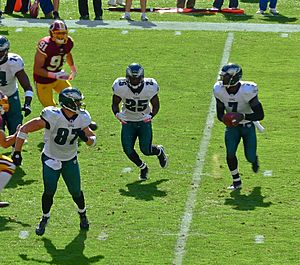
2011 season
In Week 4, against the San Francisco 49ers, Vick had 416 passing yards, two passing touchdowns, and one interception to go along with eight carries for 75 rushing yards. The final game of the season was a 34–10 victory on January 1, 2012, at home against Washington. Vick completed 24 of 39 passes for 335 yards and three touchdowns. In the 2011 season, Vick appeared in and started 13 games. He finished with 3,303 passing yards, 18 passing touchdowns, and 14 interceptions to go along with 76 carries for 589 rushing yards and one rushing touchdown. Led by Vick, Philadelphia finished the 2011 season with an 8–8 record. The team began with a 4–8 record before winning four games in a row to finish the season.
2012 season
Vick came into week one of the 2012 season as the starter, despite a solid showing from rookie Nick Foles in the preseason. Vick led the Eagles to a 17–16 victory in week one against the Cleveland Browns despite throwing four interceptions. The Eagles won the following game against the Baltimore Ravens, but lost 27–6 in the third week of the season to the Arizona Cardinals. Facing former teammate Kevin Kolb, Vick completed only 17 of 37 passes with no touchdowns and two lost fumbles. The Eagles went on to beat the New York Giants, but then lost three straight games. After the third loss against the Atlanta Falcons on October 28, calls for coach Andy Reid to replace Vick with Foles intensified. Reid refused to make the move.
The Eagles lost another game against the New Orleans Saints, and Vick remained the starting quarterback for a week 10 game against the Dallas Cowboys. Vick was injured in that game, which the Eagles lost, and was replaced by Foles. On December 3, after Vick had already been sidelined for three weeks, Reid officially named Foles the starter for the remainder of the season. After a Foles injury in week 16, Vick was named the starter for the season finale against the Giants in New York. Vick went 19 of 35 for 197 yards, a touchdown, and an interception, and also ran five times for 25 yards. The Eagles, however, lost the game 42–7, to end the season with a 1–5 division record and 4–12 overall record.
2013 season
On February 11, 2013, the Eagles and Vick agreed on a one-year restructured contract worth up to $10 million. New head coach Chip Kelly announced that Vick, Foles, and rookie Matt Barkley would compete for the starting job. After a stellar preseason, Vick was able to reclaim his starting job from Foles, who was named Vick's backup.
Vick started out well, winning his first game against Washington and throwing his first career 400-yard game in a close loss to the San Diego Chargers, with four passing touchdowns, two rushing touchdowns, and no interceptions in the two-game stretch. After that, Vick suffered losses against the Kansas City Chiefs and Denver Broncos, where he threw for one touchdown and three interceptions in that stretch (all three were thrown against Kansas City). In a game against the New York Giants, Vick was 6 of 14 for 105 yards, when he suffered a hamstring injury. Nick Foles played stellar in his place, going 8–2 as starter, while throwing 27 touchdowns and only two interceptions with a 119.0 passer rating. Vick saw his only playing time in a 15–7 loss to the Giants, where he was 6 of 9 for 30 yards and an interception, but he again suffered an injury, this time to his quadriceps, and was replaced by rookie Matt Barkley, who played even worse. Foles returned the following week, and Vick spent the rest of the season as the backup, making only one more appearance in a blowout win over the Chicago Bears.
New York Jets
Vick signed a one-year $5 million contract with the New York Jets on March 21, 2014, the same day the Jets released Mark Sanchez. The Eagles signed Sanchez one week later.
Vick chose to wear #8 as a tribute to Steve Young, although several days later he decided to change it to No. 1, as #7 was already taken by Geno Smith. Vick became the first quarterback in franchise history to wear the number. During Week 5 against the San Diego Chargers, Vick came in relief of a struggling Geno Smith following halftime and finished the game with 47 passing yards as the Jets were shut out by the Chargers, 31–0. After seven consecutive losses, Rex Ryan named Vick the starter over Smith for the Week 9 game against the Kansas City Chiefs. Vick became the first quarterback to reach 6,000 rushing yards during Week 10 in a 20–13 win over the Pittsburgh Steelers, which was one of three games that Vick started for the season.
Pittsburgh Steelers
On August 25, 2015, Vick signed a one-year contract with the Pittsburgh Steelers worth $970,000.
His signing by the Steelers caused a social media backlash by many Steeler fans, with some saying that they would never support the team again. Fans who supported or were indifferent about the signing called such fans fair weather fans, and also cited that the Steelers have several players with questionable pasts, most notably Roethlisberger and James Harrison. The Animal Rescue League of Western Pennsylvania made a subtle jab at the team on Twitter by saying that they were now more proud to support the Pittsburgh Penguins and subsequently moved an upcoming fundraiser event from Heinz Field to Consol Energy Center. Steelers president Art Rooney II defended the Vick signing on KDKA-TV, saying that they felt that Vick had proven himself since being released from prison. The Steelers had considered signing Vick in 2009—both Vick and Steelers head coach Mike Tomlin are from the same part of Virginia and know each other well personally—but decided against it due to potential backlash since Vick at the time hadn't proven himself following his release from prison.
In Week 3, Vick was brought into action against the St. Louis Rams after Roethlisberger sustained a knee injury that sidelined him for 4–6 weeks. In five weeks, Vick went 40 for 66 with two touchdowns and one interception, also rushing for 99 yards on 20 attempts. Vick suffered a hamstring injury in a win against the Arizona Cardinals and was replaced by Landry Jones. Vick would miss six games, and Roethlisberger eventually returned to his starting role. Vick would be inactive the remainder of the season, leading some sports commentators to speculate that Vick's playing career may be over.
Retirement
In 2016, Vick announced he would play one more season in the NFL. However, after not signing with a team all season, he officially announced his retirement from professional football on February 3, 2017. On June 12, 2017, Vick retired as an Atlanta Falcon.
Post-NFL career
On June 28, 2017, Vick began participating in the newly formed American Flag Football League, serving as captain of Team Vick. The following year, he captained the Roadrunners, who ultimately lost to Chad Johnson's team in the AFFL semifinal 26–13.
During their 2017 training camp, Vick joined his former coach Andy Reid as a coaching intern with the Kansas City Chiefs after stating his previous interest in coaching. After the Chiefs concluded their 2017 training camp, he become an NFL analyst on Fox NFL Kickoff on FS1.
On April 25, 2018, Vick was hired as offensive coordinator for the Atlanta Legends of the Alliance of American Football. Vick said, regarding becoming a coach, "I didn't think I ever wanted to coach but talking about the game at Fox, I get excited like I'm out there playing again. But, it's still not touching individuals. When the opportunity came about, I felt like I could really make a difference and give back to the game. …Once I found out it was in Atlanta, I thought it was a home run." Shortly before the season began, head coach Kevin Coyle announced Vick would no longer serve as offensive coordinator, but would still remain with the team as a consultant.
NFL career statistics
| Legend | |
|---|---|
| NFL record | |
| Bold | Career high |
Regular season
| Year | Team | Games | Passing | Rushing | Sacks | Fumbles | ||||||||||||||
|---|---|---|---|---|---|---|---|---|---|---|---|---|---|---|---|---|---|---|---|---|
| GP | GS | Record | Cmp | Att | Pct | Yds | Avg | TD | Int | Rtg | Att | Yds | Avg | TD | Sck | SckY | Fum | Lost | ||
| 2001 | ATL | 8 | 2 | 1–1 | 50 | 113 | 44.2 | 785 | 6.9 | 2 | 3 | 62.7 | 31 | 289 | 9.3 | 1 | 21 | 113 | 6 | 5 |
| 2002 | ATL | 15 | 15 | 8–6–1 | 231 | 421 | 54.9 | 2,936 | 7.0 | 16 | 8 | 81.6 | 113 | 777 | 6.9 | 8 | 33 | 206 | 9 | 6 |
| 2003 | ATL | 5 | 4 | 3–1 | 50 | 100 | 50.0 | 585 | 5.9 | 4 | 3 | 69.0 | 40 | 255 | 6.4 | 1 | 9 | 64 | 4 | 1 |
| 2004 | ATL | 15 | 15 | 11–4 | 181 | 321 | 56.4 | 2,313 | 7.2 | 14 | 12 | 78.1 | 120 | 902 | 7.5 | 3 | 46 | 266 | 16 | 7 |
| 2005 | ATL | 15 | 15 | 8–7 | 214 | 387 | 55.3 | 2,412 | 6.2 | 15 | 13 | 73.1 | 102 | 597 | 5.9 | 6 | 33 | 201 | 11 | 5 |
| 2006 | ATL | 16 | 16 | 7–9 | 204 | 388 | 52.6 | 2,474 | 6.4 | 20 | 13 | 75.7 | 123 | 1,039 | 8.4 | 2 | 45 | 303 | 9 | 3 |
| 2007 | ATL | Suspended / In prison | ||||||||||||||||||
| 2008 | ATL | |||||||||||||||||||
| 2009 | PHI | 12 | 1 | – | 6 | 13 | 46.2 | 86 | 6.6 | 1 | 0 | 93.8 | 24 | 95 | 4.0 | 2 | 0 | 0 | 0 | 0 |
| 2010 | PHI | 12 | 12 | 8–3 | 233 | 372 | 62.6 | 3,018 | 8.1 | 21 | 6 | 100.2 | 100 | 676 | 6.8 | 9 | 34 | 210 | 11 | 3 |
| 2011 | PHI | 13 | 13 | 7–6 | 253 | 423 | 59.8 | 3,303 | 7.8 | 18 | 14 | 84.9 | 76 | 589 | 7.8 | 1 | 23 | 126 | 7 | 2 |
| 2012 | PHI | 10 | 10 | 3–7 | 204 | 351 | 58.1 | 2,362 | 6.7 | 12 | 10 | 78.1 | 62 | 331 | 5.4 | 1 | 28 | 153 | 7 | 3 |
| 2013 | PHI | 7 | 6 | 2–4 | 77 | 141 | 54.6 | 1,215 | 8.6 | 5 | 3 | 86.5 | 36 | 306 | 8.5 | 2 | 15 | 99 | 4 | 2 |
| 2014 | NYJ | 10 | 3 | 1–2 | 64 | 121 | 52.9 | 604 | 5.0 | 3 | 2 | 68.3 | 26 | 153 | 5.9 | 0 | 19 | 85 | 5 | 2 |
| 2015 | PIT | 5 | 3 | 2–1 | 40 | 66 | 60.6 | 371 | 5.6 | 2 | 1 | 79.8 | 20 | 99 | 5.0 | 0 | 10 | 53 | 2 | 0 |
| Total | 143 | 115 | 61–51–1 | 1,807 | 3,217 | 56.2 | 22,464 | 7.0 | 133 | 88 | 80.4 | 873 | 6,109 | 7.0 | 36 | 316 | 1,879 | 98 | 43 | |
Playoffs
| Year | Team | Games | Passing | Rushing | Sacks | Fumbles | ||||||||||||||
|---|---|---|---|---|---|---|---|---|---|---|---|---|---|---|---|---|---|---|---|---|
| GP | GS | Record | Cmp | Att | Pct | Yds | Avg | TD | Int | Rtg | Att | Yds | Avg | TD | Sck | SckY | Fum | Lost | ||
| 2002 | ATL | 2 | 2 | 1–1 | 35 | 63 | 55.6 | 391 | 6.2 | 1 | 1 | 72.9 | 14 | 88 | 6.3 | 0 | 3 | 27 | 1 | 0 |
| 2004 | ATL | 2 | 2 | 1–1 | 23 | 40 | 57.5 | 218 | 5.5 | 2 | 1 | 79.0 | 12 | 145 | 12.1 | 0 | 5 | 47 | 2 | 1 |
| 2009 | PHI | 1 | 0 | – | 1 | 2 | 50.0 | 76 | 38.0 | 1 | 0 | 135.4 | 1 | 0 | 0.0 | 0 | 0 | 0 | 1 | 1 |
| 2010 | PHI | 1 | 1 | 0–1 | 20 | 36 | 55.6 | 292 | 8.1 | 1 | 1 | 79.9 | 8 | 32 | 4.0 | 1 | 3 | 21 | 0 | 0 |
| 2013 | PHI | Did not play | ||||||||||||||||||
| 2015 | PIT | |||||||||||||||||||
| Total | 6 | 5 | 2–3 | 79 | 141 | 54.2 | 977 | 6.6 | 5 | 3 | 91.8 | 35 | 265 | 9.0 | 1 | 11 | 95 | 4 | 2 | |
Political activity
In 2011, Vick lobbied for H.R. 2492, the Animal Fighting Spectator Prohibition Act, which would establish federal misdemeanor penalties for spectators of illegal animal fighting and make it a felony for adults to bring children to fights. The law passed in 2012.
Financial troubles
At the end of 2006, Sports Illustrated magazine estimated Vick's annual income between his NFL salary and endorsements at $25.4 million, ranking him just below NASCAR's Dale Earnhardt Jr. in a listing of highest earning athletes. Vick's finances suffered, however, from poor management, bad investments and lawsuits. Certified Financial Planner Michael Smith advised Vick from 2003 to 2005, but resigned after Vick took bad advice from friends, made ill-conceived investments, overspent, and otherwise undermined the wealth-building plan that Smith had created. Smith's plan was for Vick to have a net wealth of $100 million by 2010; by that date Vick was actually an estimated $20 million in debt.
In 2006, a $45 million lawsuit was pending in a dispute with Vick's original sports agents. Several lucrative endorsement deals soured.
After the dog fighting indictments were announced in July 2007, financial claims against Vick escalated. His financial affairs strained, Vick was unable to meet scheduled payments and other obligations. Within several months, he had been named in numerous lawsuits by banks and creditors for defaulting on loans, some of them related to business investments. The dog fighting property near Smithfield, Virginia had been liquidated earlier, and in November 2007, Vick attempted to sell another of his homes.
In June 2008, when Vick's brother, Marcus, was arrested and jailed in Norfolk after a police chase, he listed his residence as a $1.39 million home owned by Vick in an exclusive riverfront community in Suffolk, Virginia. Construction of a new riverfront home took place on land Vick owned in another exclusive section of Suffolk. His attorneys later estimated that he was spending $30,000 a month to support seven friends and relatives, including his mother and brother, three children, and their mothers.
Bankruptcy
On July 7, 2008, Vick sought Chapter 11 bankruptcy protection in U.S. Bankruptcy Court in Newport News after failing to "work out consensual resolutions with each of his creditors," according to court papers. The initial filing, which was incomplete, listed assets of less than $50 million and debts of between $10 million and $50 million. The seven largest creditors without collateral backing their claims were owed a total of $12.8 million. The three biggest unsecured creditors were Joel Enterprises Inc., owed $4.5 million for breach of contract; Atlanta Falcons, owed $3.75 million for a pro-rated signing bonus; and Royal Bank of Canada, owed $2.5 million in loans.
Endorsements
During his career with the Falcons, Vick became a spokesperson for many companies. He had endorsement contracts with companies including Nike, EA Sports, Coca-Cola, Powerade, Kraft, Rawlings, Hasbro, and AirTran.
Even before the animal cruelty case surfaced in 2007, however, Vick's corporate status had deteriorated. Among the negative incidents was his middle finger gesture to Atlanta football fans in 2006. Vick's first endorsement after being released from prison was a two-year deal on January 27, 2011, with Unequal Technologies, a company that produces football pads. Nike officially signed Vick again as an athlete on July 1, 2011. The company had been supplying him with complimentary gear since October 2009; his re-signing marked the first time a sponsor had brought back an athlete after dropping him.
In 2012, Vick launched a sports clothing line called V7 to be sold exclusively at Modell's. Part of the proceeds was to go to the Boys and Girls Club of Philadelphia.
Charitable foundations
Vick has been a principal in two charitable foundations, the Michael Vick Foundation and The Vick Foundation. In June 2006, Vick, along with his brother Marcus and mother Brenda, established The Vick Foundation, a nonprofit organization to support at-risk youth with after-school programs in the Metro Atlanta and Hampton Roads areas. The announcement of the new organization came just before the start of the foundation's first fundraiser, the Michael Vick Golf Classic. The inaugural event was held at the prestigious Kingsmill Golf Course in James City County near Williamsburg, Virginia in partnership with The Virginia Tech Alumni Association Tidewater Chapter, and raised more than $80,000 for charity. According to its 2006 federal tax return, the Michael Vick Foundation provided 100 backpacks to poor children in Newport News and paid for an after-school program.
After the Virginia Tech massacre on April 16, 2007, Vick and the United Way donated $10,000 to assist families affected. The Vick Foundation collected donations from communities in Atlanta and Virginia to be placed in the United In Caring Fund for Victims of the Virginia Tech Tragedy and a special fund at the United Way of Montgomery, Radford, and Floyd counties, which serves the Virginia Tech area. The Vick Foundation said the money would be used to provide help with funeral expenses, transportation for family members and other support services.
See also
 In Spanish: Michael Vick para niños
In Spanish: Michael Vick para niños
- List of NCAA major college football yearly passing leaders
- Dual-threat quarterback
- Racial issues faced by black quarterbacks
- List of left-handed quarterbacks


